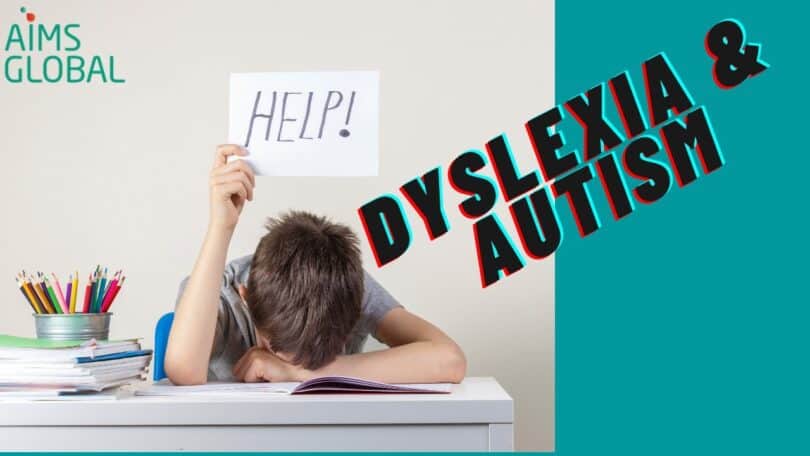Table of Contents
What Is Dyslexia
Dyslexia is a neurodevelopmental disorder that affects a person’s ability to read, write, and spell. It is a learning disorder that is characterized by difficulty with accurate and fluent word recognition, as well as poor spelling and decoding abilities. Dyslexia is a lifelong condition that can affect people of all ages and backgrounds.
Though there’s no cure for dyslexia, early assessment and intervention result in the best outcome. Sometimes dyslexia goes undiagnosed for years and isn’t recognized until adulthood, but it’s never too late to seek help.
Signs And Symptoms
- Difficulty with phonemic awareness: This is the ability to identify and manipulate individual sounds in words. People with dyslexia may have difficulty with rhyming, blending sounds together to make words, and segmenting words into individual sounds.
- Difficulty with decoding: This is the ability to sound out words and recognize them accurately. People with dyslexia may have difficulty sounding out words and may need to rely on guessing or memorization.
- Poor reading fluency: This is the ability to read quickly and accurately. People with dyslexia may read slowly and struggle to keep up with their peers.
- Poor reading comprehension: This is the ability to understand and remember what has been read. People with dyslexia may struggle to understand the meaning of the words they are reading and may have difficulty remembering what they have read.
- Difficulty with spelling: This is the ability to spell words correctly. People with dyslexia may make frequent spelling errors, including reversing letters or writing words in the wrong order.
- Difficulty with writing: This is the ability to write coherent and grammatically correct sentences. People with dyslexia may struggle with organizing their thoughts and may have difficulty expressing themselves in writing.
RELATED: What Is Autism|Signs and Symptoms|Screening and Diagnosis|Treatment|Risk Factors
Causes
The exact causes of dyslexia are not fully understood, but research suggests that it is a neurological condition that affects the way the brain processes language. Some possible causes and risk factors for dyslexia include:
- Genetics: Dyslexia often runs in families, and there is evidence that genetic factors may contribute to the development of the condition.
- Brain differences: Studies have shown that individuals with dyslexia have differences in the way their brains are structured and function, particularly in the areas of the brain that are responsible for reading and language processing.
- Environmental factors: Some studies suggest that exposure to certain environmental factors, such as toxins or infections during pregnancy, may increase the risk of developing dyslexia.
- Brain injury: In rare cases, dyslexia can be caused by brain injury or trauma.
Diagnosis
Dyslexia is typically diagnosed through a comprehensive evaluation by a trained healthcare professional, such as a psychologist, neuropsychologist, or learning specialist. The evaluation may include a variety of tests to assess the individual’s reading, writing, and language abilities, as well as their cognitive and intellectual functioning.
Some common tests used in a dyslexia evaluation may include:
- Phonological processing tests: These tests assess an individual’s ability to identify and manipulate sounds in words.
- Decoding tests: These tests assess an individual’s ability to decode words and read them aloud accurately.
- Reading comprehension tests: These tests assess an individual’s ability to understand what they are reading.
- Writing tests: These tests assess an individual’s ability to write accurately and fluently.
- Intelligence tests: These tests assess an individual’s cognitive functioning and intellectual abilities.
The evaluation may also include an assessment of the individual’s educational and developmental history, as well as input from parents, teachers, and other professionals who have worked with the individual.
RELATED: All About Depression
Treatment
While dyslexia cannot be cured, appropriate treatment and interventions can help individuals with dyslexia improve their reading, writing, and language abilities, and achieve greater success in school, work, and personal life. Here are some common treatments and interventions for dyslexia:
- Phonics instruction: Phonics instruction can help individuals with dyslexia learn the relationship between sounds and letters, and improve their decoding and reading abilities.
- Multisensory instruction: Multisensory instruction engages multiple senses in learning, such as sight, sound, and touch, which can be particularly helpful for individuals with dyslexia.
- Reading and writing support: Reading and writing support, such as extra time on tests, audiobooks, and speech-to-text software, can help individuals with dyslexia overcome their challenges and succeed in school and work.
- Educational therapy: Educational therapy is a type of individualized instruction that focuses on developing the specific skills that the individual with dyslexia needs to succeed.
- Cognitive-behavioral therapy: Cognitive-behavioral therapy can help individuals with dyslexia overcome the negative emotions and anxiety that can be associated with dyslexia, and develop a positive self-image.
- Assistive technology: Assistive technology, such as text-to-speech software, can help individuals with dyslexia overcome their reading and writing challenges and succeed in school and work.
Prevalence
Dyslexia is a relatively common learning disorder, with prevalence estimates ranging from 5-17% of the population, depending on the definition of dyslexia used and the population being studied.
Studies have found that dyslexia affects both males and females and is found in individuals of all races and ethnicities. Dyslexia is more commonly diagnosed in children, and it often persists into adulthood. However, with appropriate interventions and accommodations, many individuals with dyslexia are able to overcome their difficulties and achieve success in school, work, and personal life.
It’s important to note that dyslexia is a complex disorder with a range of symptoms and levels of severity and that not all individuals with dyslexia may be diagnosed or receive treatment. Additionally, many individuals with dyslexia may have other co-occurring learning disorders, such as attention-deficit/hyperactivity disorder (ADHD) or dyscalculia.
Impact
Dyslexia can have a significant impact on an individual’s academic, social, and emotional development. Here are some examples of the impact of dyslexia:
- Academic difficulties: Dyslexia can make it difficult for individuals to learn to read, write, and spell. This can result in academic difficulties and lower academic achievement, which can affect the individual’s future educational and career opportunities.
- Social difficulties: Individuals with dyslexia may also experience social difficulties, such as difficulty making friends, feeling isolated or excluded from social activities and low self-esteem.
- Emotional difficulties: Dyslexia can also have an impact on an individual’s emotional well-being, and may lead to anxiety, depression, and other emotional difficulties, particularly if the individual does not receive appropriate support and accommodations.
- Career limitations: If not addressed, dyslexia can lead to career limitations and difficulties with job performance, particularly in careers that require strong reading and writing skills.
However, it’s important to note that with appropriate interventions and accommodations, individuals with dyslexia can overcome their challenges and achieve success in school, work, and personal life. In fact, many individuals with dyslexia have been highly successful in a variety of fields, including business, science, and the arts. It’s important to provide support, resources, and accommodations to individuals with dyslexia so that they can reach their full potential.













